
Scope
Hayabusa2 has returned 5.4 grams of samples from the C-type asteroid Ryugu in Dec 2020, and the analysis of the return samples is on-going! Now the research of these samples is open to anyone who is interested through the announcement of opportunity.
The purpose of this international symposium is to make progress in astromaterials and space science covering a wide range of topics. The main topics for HAYABUSA2023 are new results of Ryugu sample analysis and related discussions with the results from remote-sensing, surface measurements, and sample analysis achieved by Hayabusa2 as well as OSIRIS-REx and other missions. In addition, regular topics on any extraterrestrial materials and primitive bodies in the Solar System by theoretical, observational, and experimental studies, new methodology of analysis, and future space missions are highly welcomed!
HAYABUSA2023 will be held as a hybrid event on 15-17 November 2023 on-site at JAXA Sagamihara Campas and online. Abstracts and oral/poster presentations are accepted only in English. All the students and researchers in scientific community are cordially invited to participate HAYABUSA2023. Let’s enjoy discussing the exciting results and on-going research of the Solar System science. We look forward to seeing you at this symposium!
HAYABUSA2023 will be jointly held with another symposium on planetary material sciences in Japan, "The session of Antarctic meteorites in the 14th Symposium on Polar Science" hosted by the National Institute of Polar Research (NIPR), which will be held on 14 Nov 2023 (Link).
Important dates
Date of the symposium: 15th - 17th November, 2023
| Call for proposals | 14th July, 2023 |
|---|---|
| Abstract submission start | 7th August, 2023 |
| Abstract submission due | |
| Release of program | 6th October, 2023 |
| Release of abstracts (only for registered participants) | 30th October, 2023 |
| Registration due | 10th November, 2023 |
Topics
- New results of Ryugu sample analysis
- Studies of Itokawa samples, and other primitive materials in the Solar System
- Asteroid-meteorite connections
- Theoretical, observational, and experimental studies on primitive bodies in the Solar System
- Future space missions for the Solar System origin and evolution
- Present and future curatorial work
Venue
| On Site | Conference hall (Room 1236) on the 2nd floor of the Research/Administration Building (Bldg. A), ISAS, JAXA Sagamihara Campus |
|---|---|
| Online | The oral session is held in a hybrid style, so the presentation will be shared with online attendees via Zoom. |
Organization
Astromaterials Science Research Group, ISAS/JAXA
Contact: See here